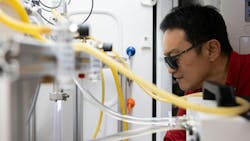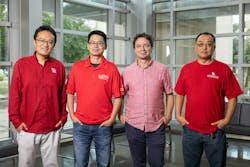University of Houston Wins $1M Grant to Boost Clean Energy
A team of scientists at the University of Houston is using artificial intelligence, microwave plasma, chemistry, materials science and engineering knowledge to find ways to harness renewable energy sources more efficiently.
The National Science Foundation awarded a $1-million grant to this project, titled "Multidisciplinary High-Performance Computing and Artificial Intelligence Enabled Catalyst Design for Micro-Plasma Technologies in Clean Energy Transition."
This project will use machine learning for catalyst discovery and develop new characterization methods for studying chemical reactions under extreme conditions such as plasma. The goal is to improve the efficiency of catalysts in hydrogen generation, carbon capture and energy storage.
The University of Houston team includes Jiefu Chen, associate professor of electrical and computer engineering; Lars Grabow, professor of chemical and biomolecular engineering; Xiaonan Shan, associate professor of electrical and computing engineering; and Xuquing Wu, associate professor of information science technology. They are collaborating with Su Yan, an associate professor of electrical engineering and computer science at Howard University, Washington, D.C.
Discovering materials for new catalytic processes requires various disciplines, such as robotics, AI, material science, synthesis, testing and modeling. The researchers plan to assemble a robotic synthesis and testing facility while simultaneously programming the AI model for unsupervised learning.
Automating the experimental testing and verification process with robotic facilities will make the catalyst design process much more efficient by closely integrating theory and experiments through advanced, unsupervised machine learning techniques, according to Shan and Wu.
The project will focus on four areas of research: machine learning driven catalyst discovery for plasma-assisted chemical reactions; multiscale and multiphysics microwave-plasma simulation; design, synthesize and characterization of the catalyst support material and architecture; and bench-scale demonstration of efficient reactions using the micro-plasma catalyst system.
The team is open to partnering with industry during and after the project and on related work.
Sponsored
Sponsored

